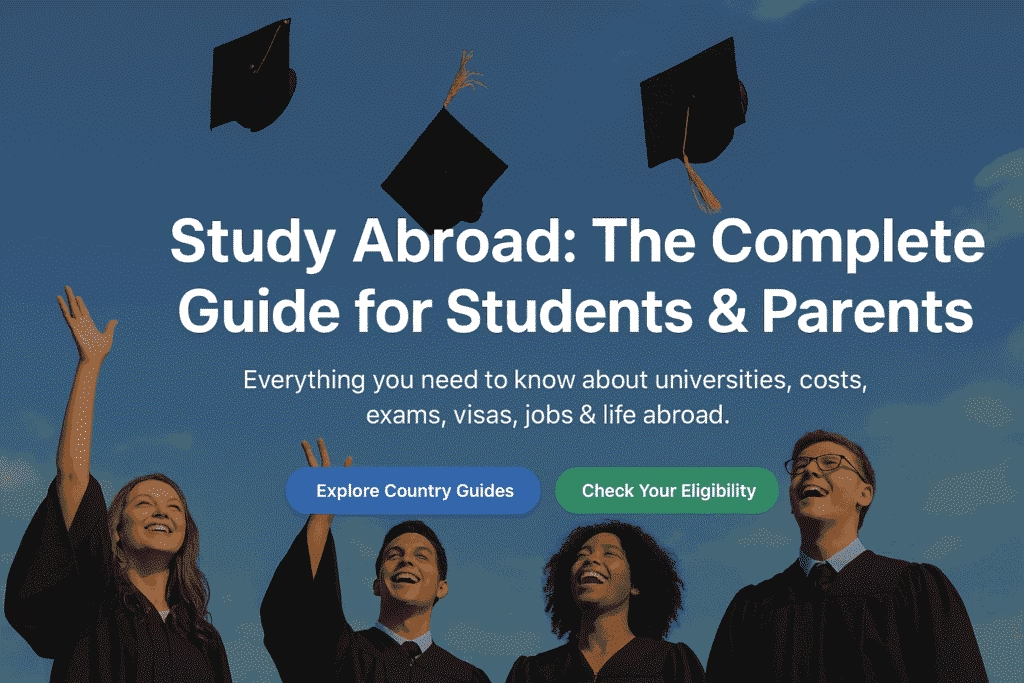Introduction
Studying abroad is one of the most transformative experiences a student can have. It offers world-class education, exposure to new cultures, international networking, and better career opportunities. However, for students and parents, the process of planning to study abroad can feel overwhelming. From choosing the right country and university to understanding eligibility criteria, preparing for entrance exams, calculating costs, arranging accommodation, and exploring job prospects – every detail matters.
This guide brings everything together in one place, helping you make well-informed decisions. Whether you dream of studying in the UK, USA, Australia, Germany, France, Canada, or New Zealand, this guide will walk you through the essentials.
Why Study Abroad?
Studying abroad is more than just academics – it’s about growth, independence, and exposure. Here are some reasons why millions of students choose this path:
- Quality Education: Access to globally ranked universities and cutting-edge courses.
- Global Exposure: Learn in a multicultural environment with students from across the world.
- Career Opportunities: Employers value international experience and diverse perspectives.
- Research & Innovation: Advanced research facilities and practical learning opportunities.
- Personal Growth: Building confidence, adaptability, and independence.
Choosing the Right Country
Every country has its strengths, costs, and opportunities. Your choice depends on your goals, budget, and preferred lifestyle.
- USA: Top-ranked universities, vast research opportunities, flexible courses.
- UK: Globally respected degrees, shorter duration courses, strong job market.
- Australia: High-quality education, post-study work visas, diverse culture.
- Germany: Affordable tuition (often free), excellent technical universities, growing economy.
- France: Strong arts, fashion, and business schools, cultural richness.
- Canada: Affordable education, immigrant-friendly, strong job prospects.
- New Zealand: Safe, peaceful, recognized degrees, affordable living.
Each country has a detailed guide (linked below) covering universities, scholarships, and student life.
Eligibility Criteria for Studying Abroad
The eligibility requirements differ by country and program, but some common factors include:
- Academic Background
- Undergraduate: Completion of Class 12 or equivalent.
- Postgraduate: A bachelor’s degree with minimum GPA/percentage required by the university.
- English Proficiency
- IELTS, TOEFL, PTE, or Duolingo English Test depending on university requirements. Which one suits you is easy to determine. To compare each one to decide click here.
- Entrance Exams (if required)
- Documents
Entrance Exams & Preparation
- IELTS/TOEFL: Test English proficiency (reading, writing, speaking, listening).
- PTE Academic: Computer-based alternative to IELTS/TOEFL.
- SAT/ACT: Standardized tests for undergraduate admission (mainly USA).
- GRE/GMAT: For graduate programs, especially in engineering, business, and management.
- Language Proficiency Tests: TestDaF (German), DELF/DALF (French), etc.
Preparation Tips:
- Start 9–12 months before intake.
- Take mock tests online to assess your level.
- Enroll in coaching if needed (offline or online).
- Practice with free resources and official guides.
Application Process (Step by Step)
- Research & shortlist countries, universities, and courses.
- Check eligibility & entrance exam requirements.
- Prepare SOP, LORs, CV, and transcripts.
- Apply via university portals / centralized systems (UCAS, CommonApp, etc.).
- Receive offer letter & arrange funding.
- Apply for student visa.
- Arrange accommodation & travel.
Costs & Living Expenses
Studying abroad is a major investment. Costs include tuition, living expenses, and additional fees.
- Tuition Fees:
- USA: $15,000 – $50,000 per year.
- UK: £10,000 – £30,000 per year.
- Australia: AUD 20,000 – AUD 45,000 per year.
- Germany: Often free or minimal (~€500 per semester).
- France: €2,500 – €15,000 per year.
- Canada: CAD 12,000 – CAD 30,000 per year.
- New Zealand: NZD 15,000 – NZD 30,000 per year.
- Living Expenses (per year):
- USA/UK: $10,000 – $15,000.
- Australia/Canada: $12,000 – $18,000.
- Germany/France: $8,000 – $12,000.
- New Zealand: $10,000 – $15,000.
Use our Eligibility & Cost Calculator Tool (Coming Soon) for personalized estimates.
Accommodation Options
Students can choose from multiple accommodation options depending on budget and lifestyle:
- On-Campus Dormitories: Convenient, safe, but limited availability.
- Shared Apartments: Affordable, with a chance to meet international students.
- Private Rentals: More privacy but costlier.
- Homestay with Local Families: Cultural exposure, meals included.
Job Opportunities While Studying
- Most countries allow part-time work (10–20 hours/week).
- Examples:
- USA: On-campus jobs (libraries, cafeterias).
- UK: Up to 20 hours per week during term.
- Australia: Up to 48 hours per fortnight.
- Canada: 20 hours per week (on/off campus).
Post-study Work Opportunities:
- USA: OPT (Optional Practical Training).
- UK: Graduate Route (2 years).
- Australia: Temporary Graduate Visa.
- Canada: Post-Graduation Work Permit.
- Germany: 18 months job search visa.
Intake Months
- USA: Fall (Aug–Sept), Spring (Jan), limited Summer (May).
- UK: September, January.
- Australia: February, July.
- Canada: September, January, May (limited).
- Germany/France: September/October, April (for some).
- New Zealand: February, July
Scholarships & Financial Aid
Many universities and governments offer scholarships for international students:
- Merit-based Scholarships: Based on academic performance.
- Need-based Scholarships: For students with financial limitations.
- Government Scholarships: Fulbright (USA), Chevening (UK), DAAD (Germany), Erasmus (EU), Australia Awards, etc.
Final Thoughts
Studying abroad opens doors to global opportunities and lifelong memories. With the right preparation, guidance, and planning, students can overcome challenges and make the most of their international education.
At Touch4Career, we are committed to being your guide throughout the journey – from choosing the right country to preparing for exams, applying to universities, and settling abroad.
Next Step: Explore Country-Specific Guides
[Study in UK] | [Study in USA] | [Study in Australia] | [Study in Germany] | [Study in Canada] | [Study in New Zealand] | [Study in France]



